Related Research Articles

The stolen body hypothesis posits that the body of Jesus Christ was stolen from his burial place. His tomb was found empty not because he was resurrected, but because the body had been hidden somewhere else by the apostles or unknown persons. Both the stolen body hypothesis and the debate over it presume the basic historicity of the gospel accounts of the tomb discovery. The stolen body hypothesis finds the idea that the body was not in the tomb plausible – such a claim could be checked if early Christians made it – but considers it more likely that early Christians had been misled into believing the resurrection by the theft of Jesus's body.

Matthew 28 is the twenty-eighth and final chapter of the Gospel of Matthew in the New Testament. This chapter records that Jesus is risen, describes the actions of the first witnesses to this event, and ends with the Great Commission.

Matthew 28:1 is the first verse of the twenty-eighth chapter of the Gospel of Matthew in the New Testament. This verse opens the resurrection narrative as Mary Magdalene and "the other Mary" visit Jesus' tomb after the crucifixion.

Matthew 28:3 is the third verse of the twenty-eighth chapter of the Gospel of Matthew in the New Testament. This verse is part of the resurrection narrative and describes the angel who arrived at the tomb of Jesus in the previous verse.
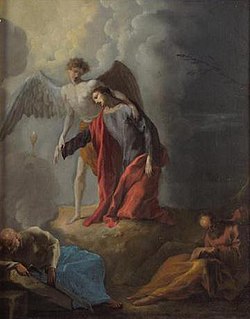
Matthew 28:4 is the fourth verse of the twenty-eighth chapter of the Gospel of Matthew in the New Testament. This verse is part of the resurrection narrative; describing the reaction of the tomb guards after the arrival of the angel of the Lord and the occurrence of an earthquake that opened the tomb.

Matthew 28:5–6 are the fifth and sixth verses of the twenty-eighth chapter of the Gospel of Matthew in the New Testament of the Christian Bible. Both verses form part of the resurrection narrative. An angel has appeared at the empty tomb and now gives instructions to Mary Magdalene and "the other Mary".

Matthew 28:7 is the seventh verse of the twenty-eighth chapter of the Gospel of Matthew in the New Testament. This verse is part of the resurrection narrative. An angel has appeared at the empty tomb and in this verse he continues his instructions to Mary Magdalene and "the other Mary".

Matthew 28:9 is the ninth verse of the twenty-eighth chapter of the Gospel of Matthew in the New Testament. This verse is part of the resurrection narrative. Mary Magdalene and "the other Mary" are leaving the empty tomb of Jesus after encountering an angel, and in this verse they encounter the risen Jesus.

Matthew 28:10 is the tenth verse of the twenty-eighth chapter in the Gospel of Matthew in the New Testament. This verse is part of the resurrection narrative. Having left the empty tomb, Mary Magdalene and "the other Mary" are on their way to meet the other disciples, when Jesus meets with them. In this verse the risen Jesus speaks with them.
Matthew 28:11 is the eleventh verse of the twenty-eighth chapter of the Gospel of Matthew in the New Testament. This verse is part of the resurrection narrative. In this verse some of the guards at the tomb return to Jerusalem to report to the chief priests.
Matthew 28:12 is the twelfth verse of the twenty-eighth chapter of the Gospel of Matthew in the New Testament. This verse is part of the resurrection narrative. In this verse the guards of the tomb, after being present for an angel hearkening the resurrection, are bribed by the priests to lie about what they saw.
Matthew 28:14 is the fourteenth verse of the twenty-eighth chapter of the Gospel of Matthew in the New Testament. This verse is part of the resurrection narrative. In this verse the priests of Jerusalem assured the safety of the tomb guards should the governor, Pontius Pilate, receive report of their failure.
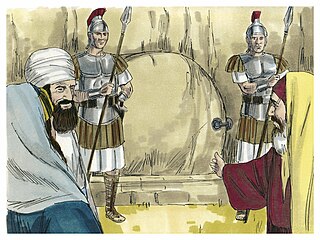
Matthew 27:65–66 are the final two verses of the twenty-seventh chapter of the Gospel of Matthew in the New Testament, coming after the crucifixion and entombment of Jesus. The chief priests and the Pharisees meet with Pontius Pilate, and he approves their request for a tomb guard.

Matthew 27:63 is the sixty-third verse of the twenty-seventh chapter of the Gospel of Matthew in the New Testament. This verse occurs after the crucifixion and entombment of Jesus. In it the chief priests and the Pharisees are meeting with Pontius Pilate.

Matthew 27:64 is the sixty-fourth verse of the twenty-seventh chapter of the Gospel of Matthew in the New Testament. This verse occurs after the crucifixion and entombment of Jesus. In it the chief priests and the Pharisees, who are meeting with Pontius Pilate, ask for a guard for the tomb.

Matthew 27:61 is the sixty-first verse of the twenty-seventh chapter of the Gospel of Matthew in the New Testament. This verse describes two women waiting by the Tomb of Jesus after the crucifixion.
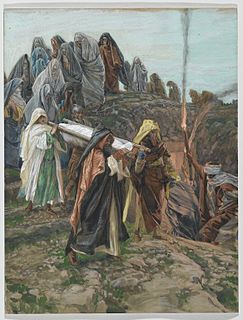
Matthew 27:60 is the sixtieth verse of the twenty-seventh chapter of the Gospel of Matthew in the New Testament. This verse describes the Entombment of Jesus by Joseph of Arimathea after the crucifixion.
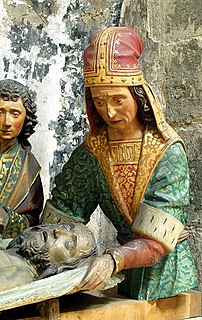
Matthew 27:57 is the fifty-seventh verse of the twenty-seventh chapter of the Gospel of Matthew in the New Testament. This verse begins a discussion of the burial of Jesus and introduces Joseph of Arimathea.
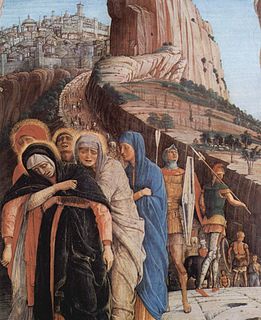
Matthew 27:55–56 are the fifty-sixth and fifty-seventh verses of the twenty-seventh chapter of the Gospel of Matthew in the New Testament. The crucifixion and death of Jesus have just occurred, and these verses make note of a group of women who were present at that event.

Matthew 10:1 is the first verse of the tenth chapter of the Gospel of Matthew in the New Testament. In this verse Jesus gathers his disciples and grants them healing powers in what is known as the commissioning the twelve apostles.
References
- ↑ Nolland, John. The Gospel of Matthew: a commentary on the Greek text. Wm. B. Eerdmans Publishing, 2005 pg. 1256
- ↑ France, R.T. The Gospel According to Matthew: an Introduction and Commentary. Leicester: Inter-Varsity, 1985.
- ↑ Keener, Craig S. The Gospel of Matthew: A Socio-Rhetorical Commentary, Wm. B. Eerdmans Publishing, 2009. pg. 713
- ↑ Davies, W.D. and Dale C. Allison, Jr. A Critical and Exegetical Commentary on the Gospel According to Saint Matthew. Edinburgh : T. & T. Clark, 1988-1997.
- ↑ Jones, Alexander. The Gospel According to St. Matthew, London: Geoffrey Chapman, 1965. pg. 319
| Preceded by Matthew 28:12 | Gospel of Matthew Chapter 28 | Succeeded by Matthew 28:14 |